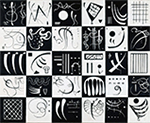
The Force of Insane Logic
"Mrs. Verloc opened her eyes" (191).
Joseph Conrad's The Secret Agent (1907)
Joseph Conrad's The Secret Agent (1907), chps. 10-13
- does the novel's sudden return to a comic tone in the beginning of chapter ten jolt the reader--does it seem inappropriate given the contents of the previous chapter, or in keeping with the novel's tonal complexity?
- after hearing the Assistant Commissioner's tale concerning Verloc, Vladimir, and Stevie, Sir Ethelred responds with "'All this seems very fantastic'" (161). The Assistant Commissioner muses that Verloc may have taken seriously what Vladimir meant to be an empty, exaggerated threat (160-61). Does all this seem equally incredible to you, the reader? Or, does the plot of this tale feel quite plausible?
- the Assistant Commissioner suggests that "we" are, from a certain point of view, "in the presence of a domestic drama" (163). Does the novel indeed feel more like a domestic drama than a thriller or political actioner?
- why does Vladimir's estimation of the London police change so rapidly?
- does verloc feel pity or sympathy for his wife? Consider the different denotations separating these two terms.
- as suggested by chapter eleven, how much information about his mission did Verloc end up giving to Stevie?
- does the narrator make Verloc into a sympathetic or unsympathetic figure in chapter eleven? Does his various qualities cancel one another out, so that we're not sure how to feel about him?
- look over chp. 11 and note places where the tone shifts,
as well as spots where voice changes. Search for moments of free indirect
discourse, judgment by the narrator, sarcasm, seriousness, tragedy, comedy,
etc. Shape an argument concerning the impact or purpose of these shifts.
- do Ossipon and Winnie attain a greater intimacy than she and Verloc shared?
Compare the external (and internal) dialogue informing these interactions
across chapters eleven and twelve.
- did Conrad implicitly support (190-93) Ossipon's terrified, "scientific" conclusion that Winnie is, like her brother, a "degenerate" (212, 217, 218)? What of the newspaper article's two options--which is the reader led to adopt as the appropriate explanation for Winnie's final actions, "madness" or "despair" (225, 226, 227)?
- most of the characters we've met so far have not changed, per se, though
our understanding of them has expanded. Do Winnie and Ossipon interrupt
this trend? Do they change?
- does the Professor cut an intimidating or pathetic figure in chapter
thirteen?
- how would you class this novel, in terms of genre? Is it an example of: naturalism, realism, the grotesque, the romance?
- respond to the following issues or claims in Schnauder's essay:
- does Winnie regress to a primordial, atavistic state as she kills her husband (Schnauder 99)
- does a scientific-materialistic approach--a social darwinist mode--indeed inform this novel throughout (Schanuder 98-101). Are there no moments of true altruism in the text? Does Conrad seem determined to suggest that we are all, upon cloose examination, bestial and bloodthirsty?
- Schanuder cites Hugh Epstein's claim that the novel contains moments that resist the ironic distance which characterizes so much of the novel (Schanuder 103). Identify such passages.
- "The Secret Agent consistently employs a materialist-scientific world view and, in contrast to its Victorian forebears, rejects any compromise with the remnants of the theological one" (104).

Thirty (1937)
Wassily Kandinsky
Dr. Paul Marchbanks
pmarchba@calpoly.edu
![]()
